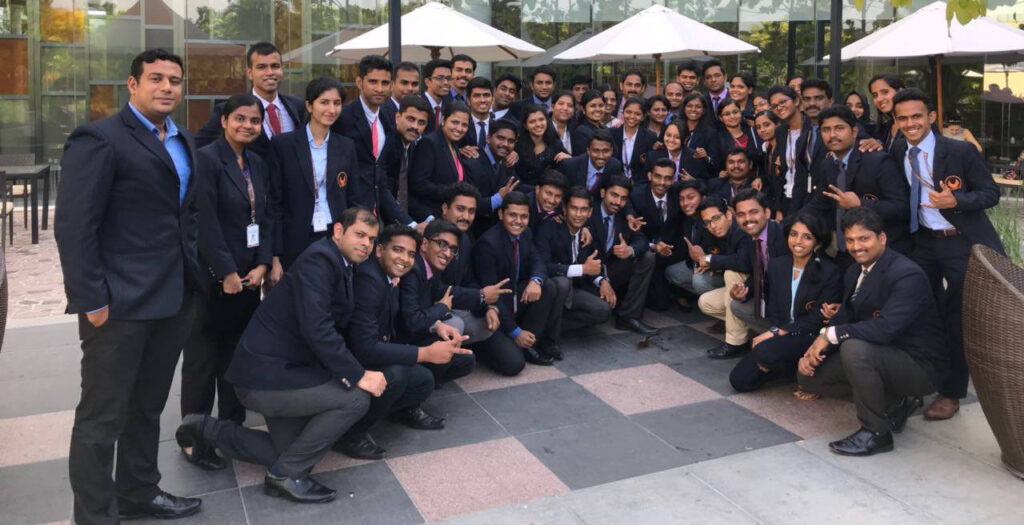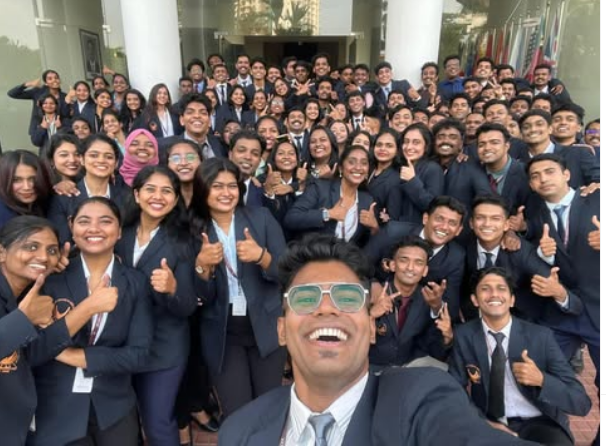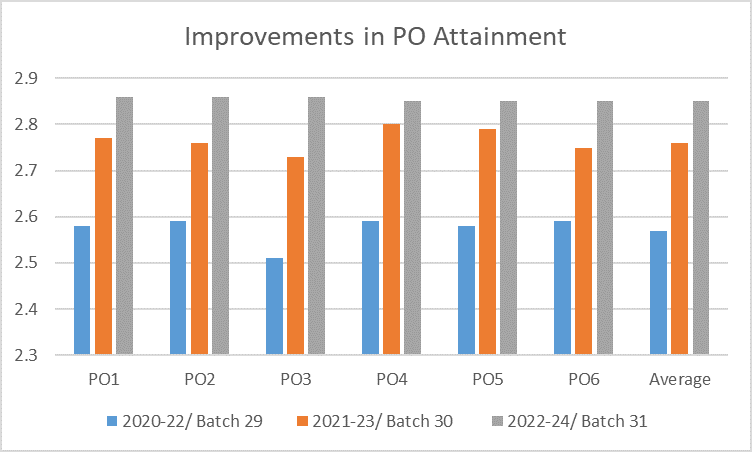Global Learning Experience…
Global Learning Experience at Hungkuang University, Taiwan…


The Post Graduate Diploma in Management (PGDM) at SCMS Cochin School of Business is a comprehensive and well-structured program that equips students with a strong academic foundation, critical managerial competencies, and a deep sense of professional responsibility. The curriculum integrates core disciplines such as finance, marketing, operations, human resources, and analytics, fostering a multidimensional understanding of contemporary business practices.
Emphasizing experiential learning, the program blends classroom instruction with industry engagement through internships, live projects, and research-based assignments. This pedagogical approach not only sharpens analytical and decision-making abilities but also prepares students to navigate complex and evolving business landscapes with confidence and clarity.
The program is driven by an accomplished faculty, an engaged alumni network, and a dedicated academic support team—together ensuring a dynamic and intellectually enriching environment for students to grow into effective and ethical business leaders.
Every course in the PGDM program is built on the KSA model — Knowledge, Skills, and Attitude — ensuring students graduate not just with a degree, but with career readiness, adaptability, and real-world competence.
Knowledge: Foundation in core management domains including Marketing, Finance, HR, Operations, and Analytics
Skills: Built through experiential learning, live projects, simulations, internships, and interactive pedagogy.
Attitude: Shaped through emphasis on ethics, leadership, innovation, teamwork, and sustainability.


At SCMS Cochin School of Business, the PGDM program offers students the flexibility to shape their academic journey (second year) in alignment with their career goals and interests.
Students can choose from two pathways:
Select 8 electives from a preferred domain (Major) and 4 electives from a secondary domain (Minor)
Opt for any 12 electives across different domains without choosing a specific Major or Minor, allowing for a well-rounded skillset
This structure ensures both depth and breadth of learning, equipping students with a competitive edge in today’s dynamic business environment.
Gain expertise in building and sustaining brands, developing products, and enhancing customer experiences. Key skills include product development, branding strategy, customer acquisition and retention, pricing and promotion techniques, and marketing analytics, preparing students for strategic, data-driven marketing decisions.
Develop analytical and decision-making skills to manage financial resources. Learn financial analysis, business valuation, risk management, investment strategies, corporate finance, and financial analytics to make sound financial decisions.
Learn to optimize processes, manage supply chains, and ensure quality and efficiency. Gain expertise in production management, supply chains, quality control, project management, and operations analytics focused on data-driven decisions.
Understand managing people and building teams in modern organizations. Gain skills in team management, organizational culture, communication, motivation, and applying HR analytics for workforce optimization.
Manage businesses in a global context with an understanding of cultural and regulatory diversity. Learn global operations, cross-cultural communication, and international trade regulations for complex global business environments.
This domain builds capabilities in data analysis, statistical modeling, and functional analytics, empowering students to extract insights and support strategic decision-making across business functions.
PEO 1: To develop managerial skills through innovative teaching and learning in a dynamic and multidisciplinary environment
PEO 2: To build professionalism and excellence among our students that is relevant to the contemporary business environment.
PEO 3: To transform students into socially responsible business leaders with a global perspective through value based education
PO1: Apply knowledge of management theories and practices to solve business problems.
PO2: Develop data analyzing, critical thinking and decision- making competencies.
PO3: Develop as ethical leaders with social and environmental sensitivity.
PO4: Develop communication skills and a global business perspective.
PO5: Imbibe a phygital and entrepreneurial mindset.
First Year: The first-year curriculum offers a comprehensive foundation in management through core subjects such as marketing, finance, operations, HR, and analytics, integrated with essential communication and behavioral skills. It also includes immersive components like the Social Immersion Program, Integrated Managerial Learning Program (IMLP), Out Bound Training (OBT) and Personality Development Program (PDP) to enhance real-world understanding and personal growth.
Second Year: The second year emphasizes specialization and practical application through domain-focused electives in Marketing, Finance, HR, Operations, and Digital Transformation, alongside core courses, capstone simulation, and a summer internship for industry readiness.
The PGDM program bridges classroom learning with real-world application, preparing students to lead and succeed in today’s dynamic business landscape.
Students gain hands-on experience through a 10-week Summer Internship, working on impactful projects with leading companies. During the academic year, they also undertake live projects involving market research, process reviews, and data analysis—applying classroom concepts to solve real business challenges.
Industry visits to manufacturing units, service organizations, and corporate offices provide students with firsthand exposure to how businesses operate across diverse sectors—enhancing their understanding of key functional areas.
Our III Series invites top business leaders to campus for guest talks, panel discussions, and experience-sharing sessions. These interactions bring alive current industry trends, innovations, and leadership strategies.
Subject matter experts and practitioners co-deliver modules within our core and elective courses. This ensures that topics like digital transformation, analytics, finance, and supply chain remain practically grounded and industry-relevant.
We collaborate with reputed professional bodies like KMA, IEDC, CII–Young Indians, and NIPM. Through these partnerships, students participate in industry events, interact with professionals, and contribute as volunteers, gaining invaluable exposure and networks.
Subject matter experts and practitioners co-deliver modules within our core and elective courses. This ensures that topics like digital transformation, analytics, finance, and supply chain remain practically grounded and industry-relevant.
We collaborate with reputed professional bodies like KMA, IEDC, CII–Young Indians, and NIPM. Through these partnerships, students participate in industry events, interact with professionals, and contribute as volunteers, gaining invaluable exposure and networks.
Igniting Minds to Create Inspiring Success Stories.
At SCMS Cochin School of Business, student life goes beyond the classroom through a vibrant ecosystem of clubs and activities that foster holistic development. From the rhythm of the Music and Dance Clubs to the strategy of the Trading Club, every interest finds a platform. The Sports Club brings out the spirit of teamwork through exciting tournaments, while the Movie Club sparks engaging cinematic conversations. Events like Ethnic Day and Sports Week celebrate culture and camaraderie. Whether it’s promoting wellness through the Health Club or driving sustainability with the Environment Club, students experience growth in every direction. Through the Media Relations Club, students take charge of SCMS’s social branding, enhancing their communication skills while building community spirit.

| Year/Batch | PO1 | PO2 | PO3 | PO4 | PO5 | PO6 | Average |
| 2020-22/ Batch 29 | 2.58 | 2.59 | 2.51 | 2.59 | 2.58 | 2.59 | 2.57 |
| 2021-23/ Batch 30 | 2.77 | 2.76 | 2.73 | 2.80 | 2.79 | 2.75 | 2.76 |
| 2022-24/ Batch 31 | 2.86 | 2.86 | 2.86 | 2.85 | 2.85 | 2.85 | 2.85 |
| Particulars | CAY m1 | CAY m2 | CAY m3 |
| (2022-24) | (2021-23) | (2020-22) | |
| (Mean of final year grade point average of all successful students on a 10-point scale) or (mean of the percentage of marks of all successful students in the final year/10) (X) | 7.61 | 7.61 | 7.43 |
| Total no. of successful students (Y) | 43 | 60 | 118 |
| Total no. of students who appeared in the examination (Z) | 43 | 60 | 118 |
| Academic Performance Index (API) =X* (Y/Z) | AP1 = 7.61 | AP2 = 7.61 | AP3 = 7.43 |
| Average API = (AP1+AP2+AP3)/3 = 7.55 | |||


Student Volunteers at KPLEX 25
Global Learning Experience at Hungkuang University, Taiwan…
